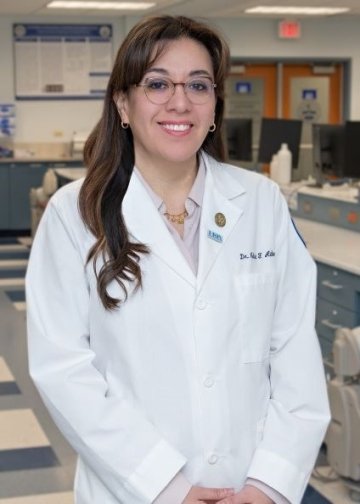
“I want people to know that neuroscience is not black and white. There is a lot that we don’t know yet, and a lot we know that will most likely change in the future when we have more knowledge.”
Years at Midwestern University:
13 years, since 2011.
Research Interests:
Peripheral nerve plasticity and regeneration (nerve recovery following an injury or resulting from nerve lesions or a health condition such as diabetes), neurodevelopment (the formation of the nervous system and its components).
What is the most rewarding part of being a member of the Midwestern University faculty?:
The balance between research and teaching allows me to develop as a good educator and contribute to the research field.
How do you engage students in the learning process?:
Class activities, hands-on activities, and small group experiences.
What do you hope students learn from your classes?:
I hope they retain the information, but more importantly that they develop critical thinking and reasoning skills. Our students are asked to learn a lot of information because we have a high-speed curriculum.
What lessons would you like students to take with them in their professional careers?:
Students should rely on their knowledge to feel comfortable and confident in any future situation.
What about your profession should people know more about?:
I want people to know that neuroscience is not black and white. There is a lot that we don’t know yet, and a lot we know that will most likely change in the future when we have more knowledge. Therefore, we can only assume how certain processes or mechanisms work based on what we know. Neuroscience research gives us more information every day.
Peripheral nerve plasticity and regeneration
The regenerative process and damage repair after a lesion is greater in the peripheral nervous system, compared to the central nervous system. With the appropriate repair mechanism, people are able to partially or fully regain sensory or motor function lost after nerve lesions. The real battle is mostly against time. The more effective the axonal regrowth, the faster the reinnervation of denervated muscles, which increases the likelihood of people regaining function. The use of biomaterial and bioengineering is huge in this field to facilitate and guide nerve regeneration. Of course the field of prosthetics shows how promising this regeneration can be in the future.
Neuro development
This was my original research field. I started with neuro development, worked on how the system develops through embryogenesis (how the embryo is formed and developed), and specifically I focused on the development of the olfactory system (sense of smell). I ran my first research project on chick embryos, and then I switched to mouse embryos studying the developing olfactory system. I also focused on Gonadotropin hormone-releasing hormone (GnRH) cells that are key for the development of reproductive function of adults.
Anything to add?:
We have had several research publications. Many students from Midwestern University gained ownership of manuscript publications and presented at national and international conferences.



